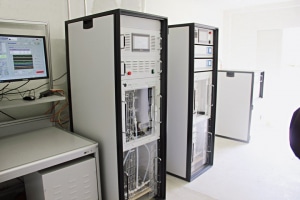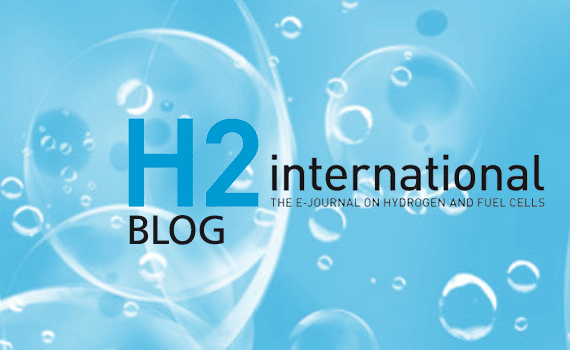At the end of April 2015, GP Joule began testing its electricity fill-in concept. As part of the 200 kW H2 biogas project, the engineers at the head office of the company in Reussenköge, Germany, installed two electrolyzers, each with 5 kW stacks. In May, the plant was extended, with 16 additional stacks initially being installed. By the summer of 2015, the first four stacks were set to be replaced with a total of 24 new modules so that the nominal output then totals 200 kW. This enables 40 cubic meters of hydrogen to be produced every hour, and the electrical energy which is stored can then be fed into the network on a time-delayed basis.
The electrolyzer stacks, which are supplied by the Lübeck subsidiary company H-Tec Systems, use excess solar- and wind-generated electricity to produce hydrogen. The gas which is produced in this way is stored on a temporary basis. If required, it is mixed with the gas mix from the local biogas plant, which contains methane in a 30/70 ratio, and then burnt in a CHP plant. The electrical energy which is generated as a result goes to the electricity network, while the thermal energy that is set free goes to the local heating network. According to the manufacturer’s details, the degree of effectiveness with the use of the electricity and heat totals up to 95%.
As the next step in this 5.9 million Euro project, which has been supported to the tune of EUR 2.1 million by the Federal Ministry of the Environment, GP Joule is planning to build a megawatt plant. To this end, completely new components will have to be developed for the PEM stack, however.
The goal of this concept is to reduce the required quantities of biomass resources with the help of solar and wind energy, and to be able to operate the biogas plant as a flexible control energy power station at the same time. This concept sees biogas plants gaining a new role, so that they don’t have to be operated at full capacity for 8,700 hours.
One major shortcoming of this concept, however, is the end-consumer levy, payable in this case due to the latest legislation governing the use of hydrogen produced in electrolyzers. Timo Bovi, Spokesman of GP Joule, had the following to say: “This double levy has hit us hard. We want the same conditions for everyone.”



























0 Comments